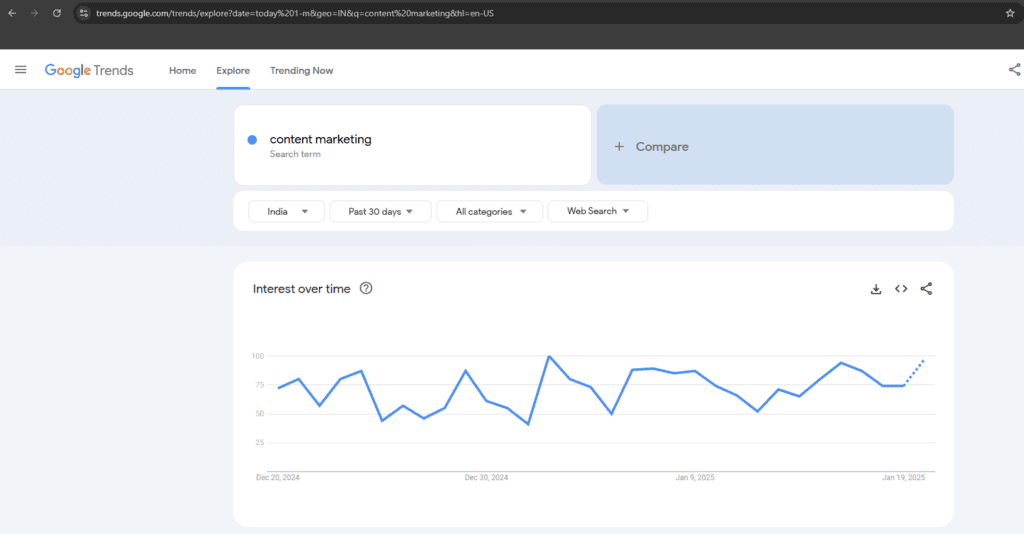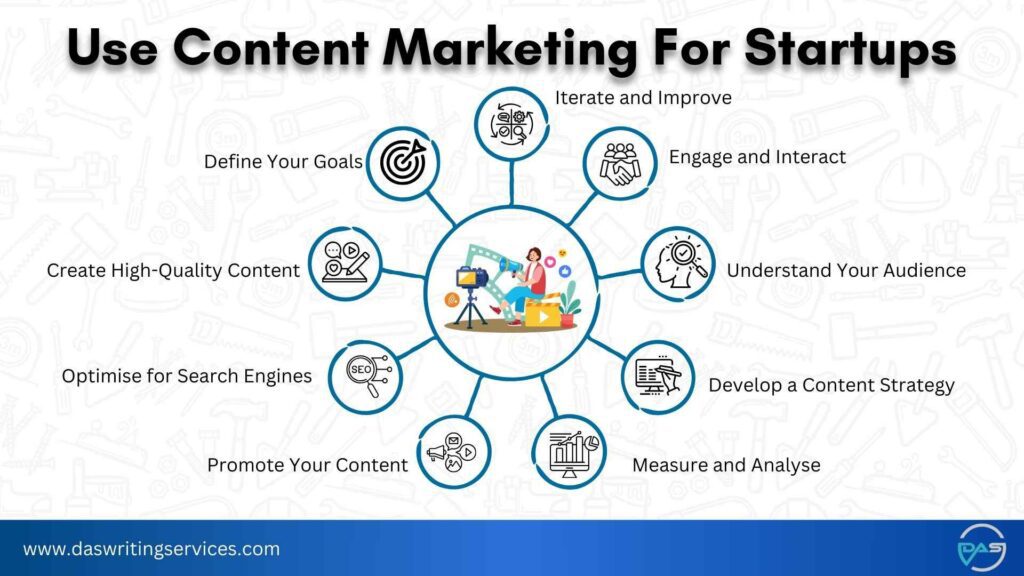The most effective way to build your brand online is by using content marketing. In the past few years content marketing for startups has seen a rise in demand.

Let us illustrate the importance of content marketing with an example. Suppose you have a company that sells women’s clothing. Now you do not have a huge amount to invest in advertisements or hiring famous people to endorse your product. Your next step will be opting for things within your budget like content marketing.
Content marketing for startups will not cause a hole in your pocket and you can market your products better than others. You can use various content platforms available to start your journey. It build your brand credibility and presence in the marketplace which in turn will increase your sales and revenue.
According to a study by Content Marketing Institute, 73% of B2B marketers and 70% of B2C marketers use content marketing as part of their overall marketing strategy.
In this blog, you will get to know about the different types of content marketing for startups and their importance.
In this fast-paced world, it is understandable that as a business owner, you might not have time to invest in the lengthy process of creating content from scratch. Do not worry we are here to solve that issue. Contact us and get a sample for free to start your content marketing journey with us.
Types Of Content Marketing for Startups
Startups can leverage a variety of content marketing types to effectively engage their target audience and achieve their marketing goals. Here are some common types of content marketing for startups that you can utilise:
1. Creating Blog Posts
Creating and maintaining a blog is a popular and effective way for startups to share valuable information, insights, and updates with their audience. Blog posts can cover a wide range of topics related to the startup’s industry, products, or services, offering educational content, industry trends, tips, how-to guides, and thought leadership pieces.
To learn some smart and effective tips on how to craft a content for your website, check out our blog.
2. Social Media Content
Startups can leverage various social media platforms, such as Facebook, Twitter, Instagram, LinkedIn, or TikTok, to distribute engaging and shareable content. This can include visual content like images, infographics, and videos, as well as short-form or long-form written posts. Social media content helps startups reach a broader audience, encourage interactions, and build a community around their brand.
For example, Zomato CEO Deepinder Goyal tweeted that he wanted a Chief of Staff who would have to pay Rs. 20 lakh to join the company! This post became viral and gave a lot of good publicity to the company. Take a look at it:

3. Videos
Video content has become increasingly popular and can be highly engaging for audiences. Startups can create videos to showcase their products or services, provide tutorials or demonstrations, share customer testimonials, conduct interviews, or create entertaining and informative content. Videos can be shared on social media platforms, websites, and video-sharing platforms like YouTube.
For example, a legal startup can put out videos on how different laws are applicable in day-to-day life, thus breaking down a complex topic in layman’s terms. Here’s a video of famous Instagram personality, lawyer Tanya Appachu Kaul, listing the things you must check while buying a flat.
4. Ebooks and Whitepapers
Startups can develop in-depth and comprehensive content resources, such as e-books or whitepapers, to provide valuable insights, research findings, or industry reports. These resources can be gated behind lead capture forms, allowing startups to collect contact information from interested prospects and nurture them through the sales funnel.
5. Podcasts
Podcasting has gained significant popularity, offering startups an opportunity to create audio content that can be easily consumed on the go. Startups can host their own podcasts, featuring discussions, interviews, or educational content related to their industry or niche. Podcasts help build a loyal audience and establish the startup as a trusted source of information and insights.
For example, Zerodha co-founder Nikhil Kamath uploads podcasts on YouTube which are viewed by lakhs of people.
6. Infographics
Infographics combine visuals and concise information to present complex concepts or data in a visually appealing and easy-to-understand format. Startups can create infographics to convey statistics, industry trends, comparisons, or step-by-step guides. Infographics can be shared on social media, included in blog posts, or used in presentations.
7. Webinars and Online Events
Hosting webinars or online events allows startups to interact with their audience in real-time, share knowledge, and demonstrate thought leadership. Webinars can cover specific topics, provide training or workshops, or showcase new products or features. Startups can promote webinars through email marketing, social media, and their website.
8. User-Generated Content
Encouraging customers or users to create content related to the startup’s products or services can be a powerful way to engage the audience and build social proof. Startups can run contests, solicit testimonials or reviews, or encourage customers to share their experiences through social media posts or blog contributions. User-generated content adds authenticity and credibility to the startup’s marketing efforts.
For example, Tata Tea’s Jaago Re campaign is currently inviting pledges to fight climate change. Here’s a video where they raise awareness about the issue.
These are just a few examples of content marketing types for startups that a business can leverage. The key is to understand the preferences and behaviours of the target audience and choose the content formats that align with their interests, preferences, and the startup’s marketing goals.
Importance Of Content Marketing For Startups
Content marketing is of great importance for startups for several reasons:
1. Building brand awareness
Startups often face the challenge of limited brand recognition in a competitive market. Content marketing allows startups to create and distribute valuable and informative content that showcases their expertise, values, and unique selling propositions.
By consistently delivering high-quality content, startups can increase their brand visibility, attract attention, and build awareness among their target audience.
2. Establishing thought leadership
Content marketing provides an opportunity for startups to position themselves as industry leaders and experts in their respective fields. By producing insightful and informative content, startups can demonstrate their knowledge, insights, and innovative ideas. This helps in building trust, credibility, and authority, which are crucial for attracting customers, investors, and potential partners.
3. Driving organic traffic and leads
Startups often have limited marketing budgets, and content marketing offers a cost-effective strategy to drive organic traffic to their website. By creating valuable and relevant content optimised for search engines, startups can improve their search engine rankings and attract organic traffic from potential customers who are actively searching for information related to their products or services. Quality content also encourages visitors to engage with the brand, subscribe to newsletters, and become leads for future conversion.
4. Nurturing customer relationships
Content marketing enables startups to engage with their audience on a deeper level. By providing valuable content that addresses their pain points, educates them, or entertains them, startups can build a loyal customer base.
Regularly publishing relevant content, such as blog posts, videos, podcasts, or social media updates, keeps the startup connected with its audience, fosters trust, and encourages repeat business and customer advocacy.
5. Differentiating from competitors
Startups often operate in crowded markets where differentiation is crucial for success. Content marketing allows startups to communicate their unique value proposition and differentiate themselves from competitors.
By developing a distinct brand voice, telling compelling stories, and offering valuable insights through their content, startups can stand out and attract customers who resonate with their message and approach.
6. Supporting other marketing efforts
Content marketing integrates well with other marketing strategies. Startups can leverage their content across various channels, including social media, email marketing, public relations, and influencer collaborations. Content can be repurposed and shared in different formats, maximising its reach and impact. Additionally, content marketing supports the effectiveness of paid advertising campaigns by providing valuable content to drive engagement, nurture leads, and improve conversion rates.
How to Use Content Marketing For Startups
To efficiently use content marketing for startups, consider the following strategies:

1. Define Your Goals
Clearly define your content marketing goals based on your overall business objectives. Do you want to increase brand awareness, generate leads, drive website traffic, or establish thought leadership? Having specific and measurable goals will help you focus your content efforts and track your success.
2. Understand Your Audience
Gain a deep understanding of your target audience their demographics, interests, pain points, and preferences. Use this knowledge to create content that resonates with them. Conduct market research, engage with your audience through surveys or social media, and analyse data to gather insights that inform your content strategy.
3. Develop a Content Strategy
Create a content strategy that aligns with your goals and target audience. Identify the topics, themes, and formats that will be most relevant and valuable to your audience. Determine the frequency of content creation and establish a consistent publishing schedule. Consider using an editorial calendar to plan and organise your content production.
4. Create High-Quality Content
Focus on producing high-quality content that provides value to your audience. Ensure that your content is well-researched, informative, engaging, and well-written. Use a mix of formats, such as blog posts, videos, infographics, or podcasts, to cater to different preferences and increase engagement. Incorporate visuals, storytelling, and data to make your content more compelling. Additionally, ensure that your content is unique and plagiarism-free.
5. Optimise for Search Engines
Implement search engine optimization (SEO) techniques to improve the visibility of your content in search engine results. Conduct keyword research to identify relevant keywords and incorporate them naturally into your content. Optimise your titles, meta descriptions, headings, and URL structures. Use internal and external links to enhance the credibility and authority of your content.
6. Promote Your Content
Don’t just rely on organic reach, try actively promoting your content through various channels. Share your content on social media platforms, email newsletters, industry forums, and relevant online communities. Collaborate with influencers or industry experts to amplify your reach. Leverage paid advertising, such as sponsored posts or native ads, to extend your content’s reach to a wider audience.
7. Engage and Interact
Encourage audience engagement and interaction with your content. Respond to comments, questions, and feedback on your blog, social media platforms, or other content channels. Foster discussions, ask for opinions and encourage user-generated content. Building a community around your content will help create brand advocates and deepen customer relationships.
8. Measure and Analyse
Continuously measure and analyse the performance of your content marketing efforts. Monitor key metrics such as website traffic, engagement, conversion rates, and lead generation. Use web analytics tools, social media analytics, and email marketing metrics to gain insights into what content resonates most with your audience. Adjust your content strategy based on these insights to optimise results.
9. Iterate and Improve
Content marketing is an iterative process. Pay attention to what works and what doesn’t. Take feedback and data-driven insights into account to refine your content strategy and improve your content over time. Stay updated with industry trends and incorporate new formats or approaches to keep your content fresh and relevant.
By following these strategies, startups can efficiently leverage content marketing to build brand awareness, engage their target audience, and drive meaningful business results.
Examples of How Content Marketing for Startups Helped Companies in India
There are several successful examples of content marketing for startups in India. Here are a few notable ones:
1. Swiggy
This is an online food delivery platform, that utilised content marketing to engage with its audience and build brand loyalty. They created a food-related blog called “Swiggy Bytes” that featured articles, recipes, and food trends. Additionally, they collaborated with popular food bloggers and influencers to share their experiences and recommendations. Through this content-driven approach, Swiggy strengthened its position as a go-to platform for food enthusiasts.
2. UpGrad
UpGrad is an online education platform, that employs content marketing to establish its expertise in the field of career development and upskilling. They created a YouTube channel featuring informative videos, interviews with industry experts, and success stories of their students. By providing valuable educational content, UpGrad gained credibility and attracted a large audience seeking career advancement opportunities.
3. Paperboat
This brand is known for its traditional Indian beverages and uses content marketing to evoke nostalgia and connect with its target audience. So, they created engaging videos and social media campaigns that showcased the cultural heritage and stories behind their products. This emotional connection resonate with consumers and helped Paperboat build a strong brand identity.
4. Nykaa
Did you know that the most popular way that Nykaa attracts customers and builds brand loyalty is by offering valuable beauty tips? Now, they have successfully gained the confidence of their audience and customers and has established itself as a trusted source. One of the largest e-commerce platforms for beauty and wellness products implemented a content-driven strategy through their blog called “Beauty Book.” They publish articles, tutorials, and product reviews to educate and inspire their audience.
5. UrbanClap (now Urban Company)
UrbanCompany is a home services marketplace, that utilised content marketing to address common household problems and provide solutions. So, they created a blog called “HomeTriangle” which covers topics related to home improvement, maintenance, and lifestyle. This content strategy positions UrbanClap as an authority in the industry and helps them engage with homeowners.
6. Zomato
Another popular online food delivery and restaurant discovery platform, implemented content marketing through its blog and social media channels. They publish food-related articles, reviews, and city guides, catering to the interests of food enthusiasts. By offering engaging and informative content, Zomato attracts a wide audience and strengthens its brand presence.
7. BankBazaar
BankBazaar is a financial services marketplace, that adopted a content marketing approach to simplify complex financial concepts and guide users in making informed decisions. They created a blog featuring articles, guides, and tools related to personal finance, insurance, loans, and credit cards. Therefore, their content strategy has positioned them as trusted financial advisors and helps users navigate through various financial products.
8. Freshworks
Freshworks, a software-as-a-service (SaaS) company, implemented a content marketing strategy focused on educating and engaging its target audience. They also created a comprehensive blogs that cover topics related to customer support, sales, and marketing. By providing valuable insights and solutions, Freshworks established itself as a thought leader in the industry, attracting a wide range of customers.
These examples demonstrate how startups in India have effectively utilised content marketing to create brand awareness, establish thought leadership, engage with their audience, and drive business growth.
Final Takeaway
To conclude, content marketing for startups is vital as it helps build brand awareness, establish thought leadership, drive organic traffic and leads, nurture customer relationships, differentiate from competitors, and support other marketing efforts. By investing in content creation and distribution, startups can achieve long-term growth, engage their audience, and build a strong foundation for success.
Subhodip Das is the founder and CEO of Das Writing Services Pvt. Ltd. He has an experience of 12 years in the field of Digital Marketing and specialises in Content Writing and Marketing Strategies. He has worked with well-established organisations and startups helping them achieve increased Search Engine Rank visibility. If you want to grow your business online, you can reach out to him here.




Leave a comment
All comments
Arghish Das
This is a really helpful article! It's great advice for startups looking to start a content marketing strategy. Thanks for sharing your knowledge!